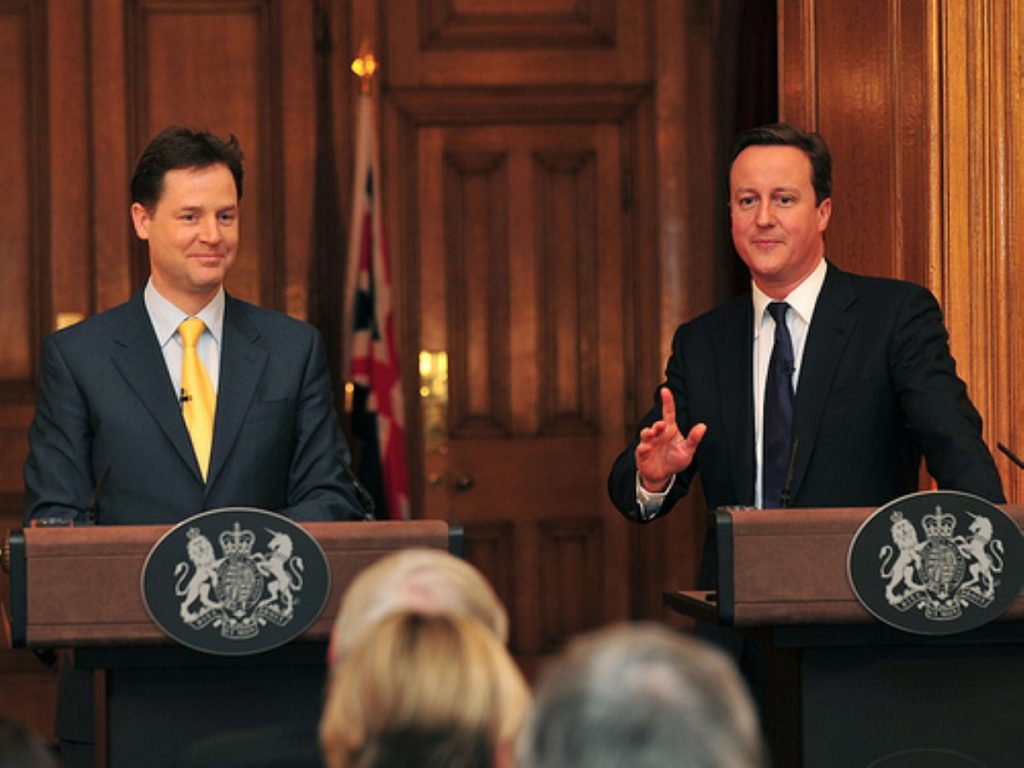Cameron and Clegg admit: ‘This hasn’t been a walk in the rose garden’
David Cameron and Nick Clegg admitted they were struggling to make the coalition work today, as they tried to relaunch the government amid widespread criticism of their performance.
Cameron said a new coalition document containing pledges about what the two parties would try to achieve in the second half of the parliament would be released by the end of the summer.
"We're two different parties – he doesn't agree with all my opinions and I don't agree with all of his," Clegg said as he stood next to Cameron at a joint press conference in the West Midlands today.
"That's coalition government. It's tough. It's not always a walk in the park or the rose garden."
The deputy prime minister downplayed the massive rebellion over House of Lords reform, saying it "happens to be one of the things that get people really hot under the collar in the Westminster village".
In a sober assessment of the government's troubles, both men offered qualified assurances that the coalition would survive until the general election in 2015.
"I'm not a betting man, but I wouldn't bet against it," Cameron said.
Clegg added: "I'd put a considerable amount of money on it."
Cameron said he was "even more committed" to the coalition now than he was in 2010.
"The world has become even more dangerous and difficult," he said.
"It's vital this government has the majority, the strength, to keep our economy safe.
"What we do is about the national interest. That’s what drives the deputy prime minister and I. That's what this government is all about."
The joint appearance comes amid wild speculation about the future of the coalition following the House of Lords rebellion on the Tory benches, which triggered a brutal war of words between Tories and Liberal Democrats.
"I think it would be logical and sensible for both parties to be able to present their separate vision to the public in time for the public to form a clear view before the election," chair of the Conservative 1922 committee Graham Brady told BBC Radio 4's Westminster Hour last night.
"Of course, it is always possible that that moment of separation could come sooner. It's very difficult to predict when that might be."
Tory MP Stewart Jackson said that if "bolshy" Lib Dems did not vote for boundary changes, they would be "out of government the next day and maybe forever".
He added: "That vote has consequences too."
Former defence secretary Liam Fox demanded Cameron be more "driven" in pursuing purely Tory policies, reminding the prime minister the minority party was only "a sixth" of the coalition.
Upcoming Tory MP Nadhim Zahawi, a Cameron loyalist who joined the Lords rebellion last week, said the plans should be abandoned if a compromise agreement could not be reached in two weeks.
Similar attacks came from the Lib Dem benches, raising fears the coalition could be on the brink of civil war.
"I don't regard it as a threat," former Lib Dem leader Sir Menzies Campbell told the BBC.
"I think [the boundary review and House of Lords reform] are two prongs of the same agreement, and I expect the first to be honoured, and I expect the second to be honoured as well.
"If you're a Liberal Democrat member of parliament whose seat has been carved up as a result of the proposals for a review of the boundaries, then the idea that you would simply march into the lobbies in support of the Conservative government's particular anxiety to obtain this piece of legislation is one which may be very hard to swallow."
Home Office minister Lynne Featherstone wrote on her blog: "There will be consequences for those Conservatives who voted against the bill but that is a matter for David.
"Our Liberal Democrat response will be taken in the light of what happens further down the line."
Meanwhile, the government is hoping a triple-whammy of announcements could silence critics who say the coalition has become tired and dysfunctional.
Downing Street announced £9 billion in rail investment this morning, including the electrification of railway lines and a fund for re-opening lines and stations – a move Cameron branded the biggest rail spending spree since the Victorian era.
There will also be plans to boost the housebuilding programme, while the road building programme pegged for 2015 would be brought forward to this autumn.
The policy announcements have been dragged together to give the coalition a boost before the summer break.
The Conservatives are likely to gain as many as 24 new MPs from the boundary reviews, but senior Lib Dems have threatened to vote against it unless the Tories find a way to push through Lords reform without a timetable.
Instead, the minority party is being offered a watered down compromise agreement which would scrap the remaining hereditary peers and cut down on numbers in the second chamber – but would not feature elections.





-01.png)